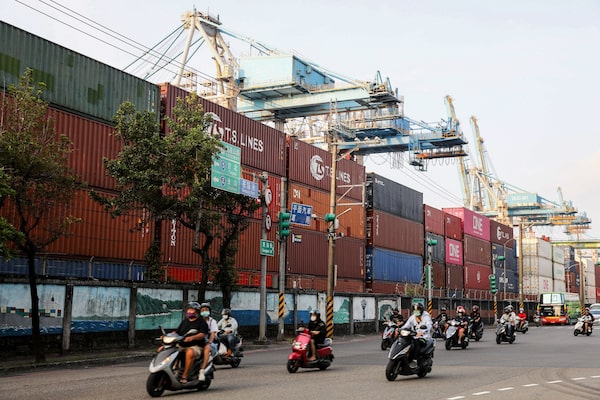
Motorists commute past shipping containers at the port in Keelung on Sept. 17, 2022.I-HWA CHENG/Getty Images
Taiwan would like to sign a bilateral trade agreement with Canada as it fights efforts by neighbouring China to diplomatically isolate the self-governing democracy of 24 million people.
Jen-ni Yang, deputy trade representative with Taiwan’s Office of Trade Negotiations, told The Globe and Mail in an interview that her government regards a trade deal as building on the groundwork laid after the Taiwanese and Canadians inked an investor protection agreement in late 2023.
She said Taiwan has been working to diversify its trade away from the People’s Republic of China (PRC), which has been increasingly menacing the island in recent years. Statistics released in January show Taiwan’s exports to the PRC in 2023 comprised 32.25 per cent of all its exports – the lowest share in 21 years. A story by Japan’s Nikkei News attributed this in part to China’s economic slowdown.
Taiwan’s deputy foreign minister, Kelly Hsieh, will be in Ottawa Monday, speaking on deepening economic ties between Canada and the island.
Taiwan is also still waiting for movement on its application to join the Comprehensive and Progressive Agreement for Trans-Pacific Partnership (CPTPP), an 11-member trade liberalization pact of countries around the Pacific Rim. Britain is on track to become a member in the near future.
Taiwan applied 2½ years ago but an application by the People’s Republic of China submitted just before the Taiwanese have made their path to membership more difficult.
Ms. Yang said Taiwan wants to expand its trade with democratic countries that follow the rule of law and, to that end, is not only seeking membership in the CPTPP but also bilateral trade agreements with countries such as Australia, Japan and Canada.
It’s negotiating a trade pact with the United States called the U.S.-Taiwan Initiative on 21st Century Trade – an effort that has already yielded an agreement, signed in 2023, on customs and border procedures, regulatory practices and small business.
Global Affairs spokesman Jean-Pierre J. Godbout Friday said Ottawa is committed to pursuing “multifaceted engagement” with Taiwan under its 2022 Indo-Pacific strategy and said any strengthening of trade relationships in the region will “always be guided by Canadian values.”
A source familiar with the matter said Ottawa is interested in bilateral trade arrangements with Taipei and has some proposals under discussion. Anything that might arise from this, however, would not be a full trade agreement because of the lack of official diplomatic relations with Taiwan, the source said. The Globe and Mail is not identifying the individual because they were not authorized to speak publicly on the matter.
Taiwan is Canada’s 12th-largest trading partner and sixth largest in Asia, according to Global Affairs. Total merchandise trade with Taiwan in 2022 was $12-billion, with Canadian merchandise exports of $2.6-billion, and imports from Taiwan at $9.5-billion.
Ottawa is trying to help Taiwan while steering clear of actions that might draw the wrath of an increasingly aggressive China, which treats the island as a renegade province and wants to annex it.
Chinese President Xi Jinping has not ruled out using force to seize Taiwan and has stepped up efforts to cut off the island’s relations with other countries. In 2000, Taiwan had diplomatic relations with 29 member states of the United Nations, as well as the Vatican. Today, the number is down to 11, plus the Holy See.
Canada has not recognized Taiwan as a sovereign state since 1970, when then-prime minister Pierre Trudeau switched diplomatic relations to Communist-led China. Many countries have done the same. Western countries have nevertheless tried to expand informal ties with Taiwan.
Vina Nadjibulla, vice-president of research and strategy at the Asia Pacific Foundation of Canada, said Ottawa’s position as chair of the Trans-Pacific Partnership commission for 2024 offers a chance for the Canadian government to set up a transparent process for assessing and accepting new members.
“Canada takes up the chair of the commission at an opportune moment to show some leadership and move forward the process – at least by which future candidates would be evaluated and applications would be considered,” Ms. Nadjibulla said.
She said Canada could kick-start the task of creating a transparent merit-based process, which all aspirant countries and economies would have to meet to be able to join.
“You’re not saying no to this particular applicant or this particular country,” she said, “you’re just saying we need to all agree on the process and a set of standards.”
Ms. Yang, Taiwan’s deputy trade representative, said her country believes it can meet the high standards for entry into the CPTPP. She noted that in 2023, the Switzerland-based International Institute for Management Development ranked Taiwan the sixth most competitive economy in its World Competitiveness Yearbook. By comparison, Canada was ranked 15th.
Asked whether Canada would use its position as chair of the CPTPP commission this year to help Taiwan join, Global Affairs’s Mr. Godbout said Canada “seeks to advance discussions among members on accession, among other priorities and Canada’s position on any aspirant economy will always be guided by what is in the best interests of Canadians.”
In recent years, Beijing has ramped up efforts to isolate Taiwan from the international community, including by denying it the chance to participate in global bodies such as the World Health Organization’s regular assemblies, and by persuading countries that recognize Taiwan as a sovereign country to sever relations.
China has also been flooding the island with disinformation campaigns, has blocked some Taiwanese imports and has encircled it with military exercises that include missile launches.
Chinese military aircraft have increasingly crossed the median line in what Taiwan calls escalating harassment: That’s the midpoint in the waterway between Taiwan and China, which Taipei says was previously tacitly accepted by Beijing as an unofficial buffer.
 Steven Chase
Steven Chase